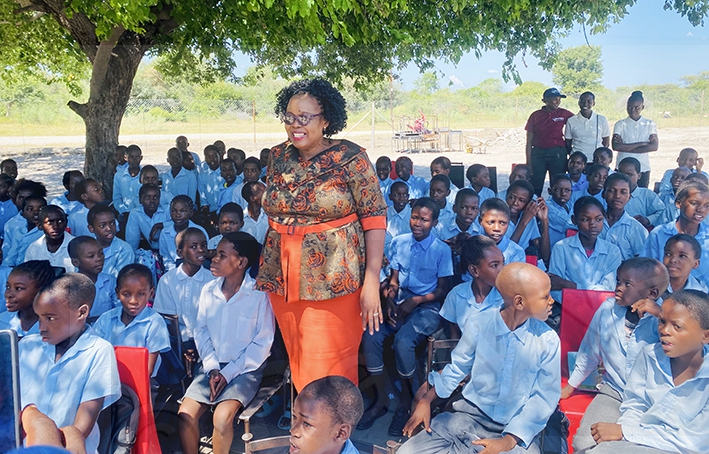Ram initiative symbol of hope
22 Sep 2024
The arid landscape of Botswana, often unforgiving, has seen a new bloom of life, thanks to a ram named ‘Masisi’.
The El-de France stud, a gift from President, Dr Mokgweetsi Masisi’s ram and buck initiative, has become a symbol of hope and prosperity for Ms Idah Mathambo.
Like a tiny seed planted in a barren soil, Masisi, the ram, has blossomed into a powerful force, multiplying not just in offspring, but also in renewed sense of optimism in the community.
Since joining Ms Mathambo’s flock in 2021, ‘Masisi’ has become a veritable of reputation, siring 45 offspring in just two years.
Ms Mathambo explained that Masisi, the ram, had been a prolific father. In 2022, he had sired a respectable nine offspring, adding to the growing flock, “The following year, his success doubled, with 14 new lambs arriving.
The year 2023 proved to be merely a warm-up,” she added.
She said ‘Masisi’ the ram, had truly outdone himself, welcoming a whopping 22 little ones into the world.
“With the number of lambs steadily increasing each year, it seems next year will bring even more, a testament to ‘Masisi’s’ undeniable charm and the promise of a flourishing flock.
This remarkable feat, doubling Ms Mathambo’ s breeding stock, is a testament to the initiative’s success and the impact of a single, well-chosen animal.
“He is a gift from the President, and we are grateful for his generocity,” says Ms Mathambo, her face beaming with pride and gratitude.
She said ‘Masisi’, the ram, was a strong, healthy, adding that his offspring are just as good.
“The robust health of ‘Masisi’s’ progeny is a clear indicator of the breed’s quality.
“We named him ‘Masisi’ to show our appreciation,” said Ms Mathambo, highlighting the deep gratitude felt by the beneficiary family towards the President’s initiative.
Ms Mathambo said the name Masisi had become synonymous with hope, progress, and the tangible impact of government programmes on the lives of ordinary people.
She said the story of ‘Masisi’, the ram, was not just about breeding numbers, but about the transformative potential of targeted interventions.
“It showcases the power of livestock improvement in bolstering livelihood, empowering communities, and fostering a sense of shared responsibility for a brighter future.
Beyond the immediate benefit of increased sheep numbers, Ms Mathambo’s story speaks volumes about the ripple effect of the initiative.
The success of ‘Masisi’, the ram, has inspired other beneficiaries, creating a ripple effect of hope and innovation throughout the community.
Ms Mathambo explained that ‘Masisi’s’ legacy would continue to grow with each new generation of sheep he fathered.
As his progeny matures and start their own families, the impact of the President’s initiative will continue to multiply, leaving behind a legacy of sustainable development.
What is more interesting about ‘Masisi’, the ram, is that in animal husbandry, breeding fathers and daughters (or mothers and sons), is generally discouraged.
This practice, known as inbreeding, can lead to increased risk of genetic defects, reduce fertility, vigor, and reduce genetic diversity.
“And ‘Masisi’s’ behaviour is particularly interesting because it aligns with the ethical and scientific principles of animal husbandry,” said Ms Mathambo.
She said ‘Masisi’ demonstrated an awareness of kinship and avoided breeding with his own offspring, even though it was a natural instinct for rams.
“It underscores the importance of responsible breeding practices in animal husbandry,” said Ms Mathambo.
Overall, ‘Masisi’s’ story is a great example of how animals can exhibit complex and sometimes unexpected behaviours.
Acting chief technical officer in the Department of Animal Health, Ms Lizibo Dambe said since the inception of the buck and ram, the North East District has seen 11 small stock farmers benefiting from the initiative.
She said the President donated three bucks and eight rams to various beneficiaries who had shown keen interest in livestock rearing.
Ms Dambe explained that some of the bucks and rams had died due to various illnesses whilst some had gone astray and had never been recovered.
President Masisi’s purchase of bucks and rams for farmers across the country was geared towards improving breeds, as he felt that there was need to intensify efforts to increase the small stock population, which has declined over the years.
Also, the initiative of distributing rams and bucks to farmers across the country is aimed at promoting the quality and quantity of small stock towards commercialising the country’s small stock sub-sector.
All these efforts are aimed at ensuring that Botswana affords a constant supply of quality and quantity to the external markets, he said.
Botswana’s national population of sheep and goats stands at 264 962 and was just over 1.2 million respectively in 2019, according to Statistics Botswana. ENDS
Source : BOPA
Author : Thamani Shabani
Location : SEKOKWE
Event : Development news
Date : 22 Sep 2024





